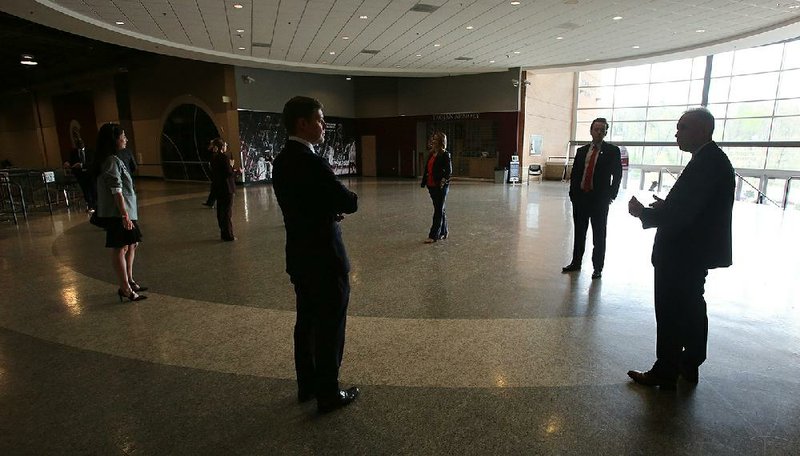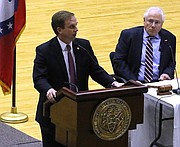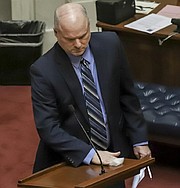1:20 A.M. UPDATE:
Arkansas Gov. Asa Hutchinson has signed the legislation that lawmakers unanimously approved by the House and Senate during a midnight session.
EARLIER:
The Arkansas Legislature early today sent Gov. Asa Hutchinson identical bills that would allow him to tap $173 million from a new "rainy-day" fund to help fill budget holes and unexpected needs triggered by the coronavirus pandemic.
The Republican governor just Wednesday summoned the General Assembly for the special session that started Thursday to vote on the single bill, of which there were matching House and Senate versions. The session was called after legislative leaders ensured there was sufficient backing for the proposal.
On Monday, Hutchinson's administration cut the general revenue budget by $353.1 million, to $5.38 billion, for the remainder of fiscal 2020, which ends June 30.
Hutchinson linked the cut to a projected decline in state tax collections in the next three months because of business slowdowns and layoffs attributed to the pandemic.
[CORONAVIRUS: Click here for our complete coverage » arkansasonline.com/coronavirus]
Another factor, also tied to the pandemic, was his extension of the individual income tax filing and payment deadline from April 15 to July 15, matching a step taken by the federal government. The change means that revenue will come in fiscal 2021, which starts July 1.
On Friday afternoon, the 100-member House and 35-member Senate unanimously passed the bills proposed by their respective leaders.
House Bill 1001 was sponsored by Speaker Matthew Shepherd, R-El Dorado, and Senate Bill 2 was sponsored by Senate President Pro Tempore Jim Hendren, R-Sulphur Springs.
The measures would create the Covid-19 Rainy Day Fund, which would receive $173.6 million in unallocated surplus funds.
"We really came together," Shepherd said Friday afternoon.
"We understand that we're in a period of time that presents some severe challenges and it was important for us to come together, find common ground and send a unified voice to let the people of Arkansas know that we're doing all that we can to try and address that issue."
Hendren told senators Friday afternoon that "there is a $350 million hole in our budget because of the economic downturn [and] we got this $170 million and hopefully some other fund balances and reserves that we can use to try to fill that hole."
He said the state will be precluded by federal law from using money it receives under the federal coronavirus relief package to fill state budget holes.
"These federal dollars are to be used for things regularly associated with the health care consequences to the covid-19 crisis," Hendren said.
BILLS APPROVED
Shortly after midnight Friday, the Senate voted 35-0 to approve HB1001 and the House voted 100-0 to approve SB2, sending the bills to the governor on the third and final day of the special session.
Hutchinson said at his news conference Friday afternoon that he planned to sign the bills early today.
"It is just recognizing the urgent work that they did and that I want to respect them by being here when that is passed [and] as they bring it to our desk," he said.
Hutchinson said he plans to use the funds to make sure that state agencies, such as the Department of Health and the Division of Emergency Management, have the resources they need covered in the budget and also to potentially help pay for critical equipment such as ventilators.
Monday's cut trimmed the general revenue budget at the Health Department by $3.4 million, to $78.4 million. The department had a $78.4 million budget last fiscal year.
SB2 and HB1001 would require the state's chief fiscal officer to use the money on spending authorized by the General Assembly and "to offset general revenue reductions, funding needs and unanticipated needs created by the covid-19 crises."
Under these bills, the release of any money from the covid-19 fund would require approval of at least two of three legislative leaders in both the House and Senate.
This approval would come either electronically or in writing.
The House leaders would be at least two of the following three people: the speaker; Rep. Marcus Richmond of Harvey, the Republican leader; and Rep. Fred Love of Little Rock, the Democratic leader, or their designees.
In the Senate, the officials would be two of the following three people: the president pro tempore; Sen. Bart Hester of Cave Springs, the Republican leader; and Sen. Keith Ingram of West Memphis, Democratic leader.
The bills explain how approval would be given:
"In the event the majority party leader or the minority party leader is not available within two hours after the notification [of the funding request] has been given or has recused, the Speaker of the House or the President Pro Tempore of the Senate shall contact the non-responding majority party designee or non-responding minority leader designee and the designee shall either be immediately available or is deemed to vote for approval of the release of funds from the Covid-19 Rainy Day Fund."
The Legislature will be told about requests for using the funds, the approvals and a summary of how the money was spent under the bills.
REJECTED CHANGE
The Senate on Thursday rejected an amendment by Sen. Jimmy Hickey, R-Texarkana, to Hendren's bill that would have required the prior approval of the Legislature's Joint Performance Evaluation and Expenditure Review Committee for the release of funds. Hickey's amendment would have added the speaker and president pro tempore as voting members to the committee.
Hickey voted Friday for SB1, though he said he disliked the provision under which "a vote could be a yes vote without a member there."
"But by the same token, it is so critical right now and, since I was allowed to do the amendment and it didn't pass, I thought that this was the most prudent thing for the citizens, so that's why I went ahead with it," he said.
Under the bills, on June 30, the last day of fiscal 2020, the chief fiscal officer would transfer any remaining funds in the covid-19 fund back to the general revenue allotment reserve fund, which is the repository for unallocated surplus funds.
HEALTH PRECAUTIONS
To protect lawmakers' health while meeting in the middle of a pandemic, a number of precautions were taken to keep legislators at a distance from one another.
The 100-member House met in the Jack Stephens Center at the University of Arkansas at Little Rock. About 20 of the 35 senators had empty chairs between them in the Senate chamber, while the rest of the senators were in the galleries, offices and elsewhere.
Both chambers on Thursday passed rule changes that will allow for the expanded use of proxy voting during this special session and the biennial fiscal session that starts April 8.
Sen. Will Bond, D-Little Rock, on Friday read to the senators a statement from Sen. Missy Irvin, R-Mountain View, in which Irvin said she wasn't with the senators in the special session because her husband, who is a doctor, is on the front line seeing patients at a clinic and hospital. She said she didn't want to place any senators at risk unknowingly at this critical time.
"Two of the first Arkansans we have lost resided in my district -- the beautiful town of Greers Ferry," Irvin said in her written statement. "There is much suffering amongst this entire community, especially the church that has been hit so hard. They came together to worship God, unknowingly exposing themselves and others to this deadly virus. They need all the support we can give them through our prayers, but also through our intense focus to win this war."
FISCAL SESSION
Shepherd said Friday afternoon that House leaders and staff members had yet to determine a location for assembling the 100-member body on April 8.
He said discussions would soon start toward planning for that session.
"We have an idea of the things we need to consider," Shepherd said. "I think one of the big issues is going to be when we convene on April 8, do we stay in session or do we come back and meet in close proximity to that or do we break and wait until later in the allotted time to come back and meet?"
Hendren said he expects the Senate to operate in the fiscal session with similar restrictions concerning their proximity to one another that they had in the special session.
He said it's very likely that the House and Senate will extend the fiscal session to allow lawmakers to meet up to the maximum 45 days allowed under the Arkansas Constitution.
"Whether we recess to give ourselves more time and give [the Department of Finance and Administration] more time to put together the budget modifications or whether we continue the work on a limited schedule, we don't know yet," Hendren said.
"I think people haven't fully grasped the magnitude of the budget implications of what's happened," he said. "We are not used to cutting budgets.
"There's going to be some coming to terms with the new reality that we find ourselves with regard to the economy and the budget, so it is going to be a challenge, particularly in the environment where we are limited in how we can interact with each other," Hendren said.
"But I'm still confident that we'll put together a plan that we can support. We may have to do something temporary and come back in a special session when we do have the opportunity to interact and debate more thoroughly to refine," he said.
Metro on 03/28/2020


